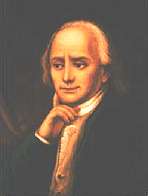Francis Lightfoot Lee was a Virginian delegate to the second Continental Congress, a signer of the Declaration of Independence and the Articles of Confederation, and served on the Virginia House of Burgesses.
Early Life & Education
Francis Lightfoot Lee was born October 14, 1734 in Virginia, the fourth son of Thomas Lee and Hannah Ludwell. His family is descended from one of the first British families to land in Virginia.
Both his parents died in 1750, leaving Francis, also called Frank, in the care of his older brother, who decided Francis would be a farmer requiring no formal education. Although his older brothers were educated in England, Frank and his younger brother were homeschooled; he took a particular interest in science. In spite of his mediocre education, he took an interest in local politics, studied hard, and learned the rest by observing his older brothers.
Politics

Francis Lightfoot Lee, Virginian signer of the Declaration of Independence
Public domain image.
Francis Lightfoot Lee was a political radical, strongly against the Stamp Act. He served in the Virginia House of Burgesses in 1758 along with 2 of his brothers one of which signed the Declaration of Independence) and 2 cousins. His only legislative contribution was to draft a bill allowing residents in Loudon County to pay their taxes in trade goods rather than money. He was among those who called for a congress of delegates from all 13 colonies.
He served until 1768, after which, in 1769, he married Rebecca Tayloe, his second cousin, about whom little is known. The pair never had any children, but they did raise Frank’s 2 nieces as their own. He received as a wedding gift a tract of land which he began to develop while still dabbling in politics, even serving as a justice of the peace for a while.
In 1774, he was very active in fighting for the first Virginia Convention. His political activism earned him the title of delegate to the Second Continental Congress, along with his brother Richard Lee. It was during this time that Lord Dunmore, the Royal Governor of Virginia offered slaves their freedom if they fought for England. This tipped Francis Lightfoot Lee over the edge and he determined that full independence from Britain was America’s only option. He is a signer of both the Declaration of Independence and the Articles of Confederation (pre-Constitution). He is not known to have spoken during Congressional debates.
Controversy
During his second term in Congress, his family underwent a huge political attack from enemies who would see the Lees’ influence lessened. These attacks only worsened during his third term when Silas Deane (diplomat who served with John Adams and Benjamin Franklin in France) began accusing the Lees of treason and corruption. Francis Lightfoot Lee and Richard Henry Lee, exhausted from these highly personal attacks which lasted about 2 years, resigned from Congress in 1779.
Final Years
He served in the Virginia Senate for several years before retiring. He lived his whole life in Virginia and watched all of his brothers die before he himself died on January 17, 1797, ten days after his beloved Rebecca.


